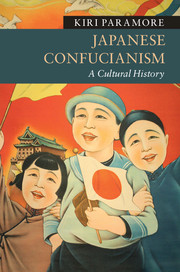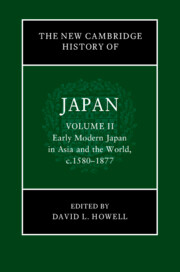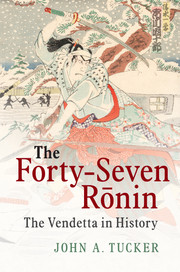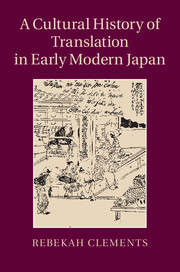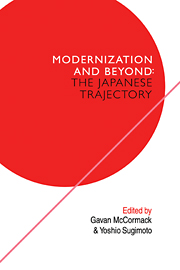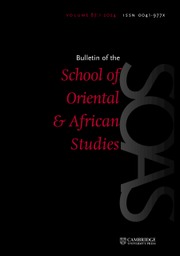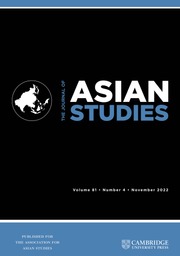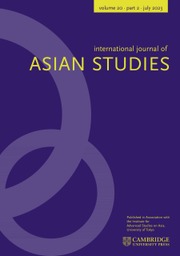Japanese Confucianism
A Cultural History
Part of New Approaches to Asian History
- Author: Kiri Paramore, Universiteit Leiden
- Date Published: April 2016
- availability: Available
- format: Hardback
- isbn: 9781107058651
Hardback
Other available formats:
eBook
Looking for an inspection copy?
This title is not currently available for inspection. However, if you are interested in the title for your course we can consider offering an inspection copy. To register your interest please contact [email protected] providing details of the course you are teaching.
-
For more than 1500 years, Confucianism has played a major role in shaping Japan's history - from the formation of the first Japanese states during the first millennium AD, to Japan's modernization in the nineteenth century, to World War II and its still unresolved legacies across East Asia today. In an illuminating and provocative new study, Kiri Paramore analyses the dynamic history of Japanese Confucianism, revealing its many cultural manifestations, as religion and as a political tool, as social capital and public discourse, as well as its role in international relations and statecraft. The book demonstrates the processes through which Confucianism was historically linked to other phenomenon, such as the rise of modern science and East Asian liberalism. In doing so, it offers new perspectives on the sociology of Confucianism and its impact on society, culture and politics across East Asia, past and present.
Read more- Offers a new approach to the study of Confucianism in Japan from the perspective of cultural history
- Challenges former understandings of how Confucianism affects society, culture and politics across East Asia
- Provides an account of an East Asian tradition which links pre-modern, modern and contemporary history
Awards
- Winner, 2016 Choice Outstanding Academic Title
Reviews & endorsements
'An outstanding study of the complex and multiple manifestations of Confucianism throughout Japanese history. Through rich historical analyses, Kiri Paramore reveals the surprising and often counter-intuitive roles that Confucianism has played in Japan. This is a book that challenges many of our assumptions about Confucianism and that opens up new ways of thinking about both Japanese history and Confucianism in general.' Michael Puett, Walter C. Klein Professor of Chinese History, Harvard University, Massachusetts and author of Ritual and its Consequences
See more reviews'Kiri Paramore has written a marvelous book about Confucianism in Japan as a hermeneutic tradition. It is interpreted and lived variously as establishment orthodoxy and subversive authority, as expressive individualism and fascist control, as religious truth and pragmatic dialogue. Its polymorphic role is key to grasping its enduring power in East Asia.' Prasenjit Duara, Raffles Professor of Humanities, National University of Singapore and author of The Crisis of Global Modernity
'If you want to understand the Confucian revival in China, you need to read Kiri Paramore's Japanese Confucianism: A Cultural History. The book's significance goes beyond its nuanced analysis of Confucianism's multiple iterations in Japan. It also explains how Confucianism has become so central in the rise of popular cultural nationalism in China today.' William A. Callahan, London School of Economics and Political Science and author of China Dreams
'Kiri Paramore's Japanese Confucianism: A Cultural History offers a welcome and groundbreaking approach to the current revival of interest in Confucian and Neo-Confucian studies. … The greatest value of this book, however, is its contribution to the field of East Asian Confucian and Neo-Confucian studies. In presenting Japanese Confucianism as a multifaceted tradition outside of China for … more than one thousand years, Paramore has opened the field to new interpretations of what was once considered a hide-bound, monolithic orthodoxy.' Alison Jameson, Reading Religion
'Paramore's analysis remains extremely well-informed and readable throughout the book without unnecessary concessions to academic jargon, thus making it equally useful as a text for courses on Japanese religions.' Ugo Dessì, Religious Studies Review
Customer reviews
Not yet reviewed
Be the first to review
Review was not posted due to profanity
×Product details
- Date Published: April 2016
- format: Hardback
- isbn: 9781107058651
- length: 248 pages
- dimensions: 235 x 156 x 19 mm
- weight: 0.47kg
- contains: 6 b/w illus. 6 maps 1 table
- availability: Available
Table of Contents
Introduction
1. Confucianism as cultural capital: mid-first millennium AD – late sixteenth century AD
2. Confucianism as religion, 1580s–1720s
3. Confucianism as public sphere, 1720s–1868
4. Confucianism as knowledge, 1400s–1800s
5. Confucianism as liberalism, 1850s–1890s
6. Confucianism as fascism, 1868–1945
7. Confucianism as taboo, 1945–2015
Bibliography
Index.
Sorry, this resource is locked
Please register or sign in to request access. If you are having problems accessing these resources please email [email protected]
Register Sign in» Proceed
You are now leaving the Cambridge University Press website. Your eBook purchase and download will be completed by our partner www.ebooks.com. Please see the permission section of the www.ebooks.com catalogue page for details of the print & copy limits on our eBooks.
Continue ×Are you sure you want to delete your account?
This cannot be undone.
Thank you for your feedback which will help us improve our service.
If you requested a response, we will make sure to get back to you shortly.
×
